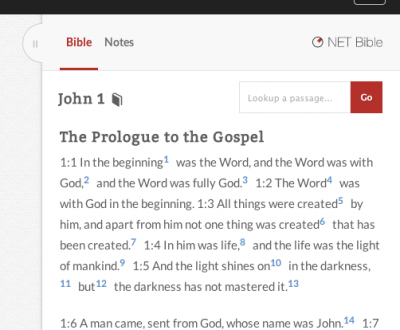Immanuel vs. Emmanuel, or A Question of Translation Philosophy
A NET Bible reader recently posted this question in our comments database concerning Matthew 1:23:
“Should the name be Immanuel instead of Emmanuel?”
This is a great question for a number of reasons.
A NET Bible reader recently posted this question in our comments database concerning Matthew 1:23:
“Should the name be Immanuel instead of Emmanuel?”
This is a great question for a number of reasons.
I can answer it best with some linguistic data, but there is an interesting aspect of translation philosophy to consider at the same time. The question is important because the same name is spelled differently in two places in the NET Bible. Matthew 1:23 contains a citation of Isaiah 7:14. In the Isaiah passage, we translate the name as Immanuel, starting with the letter I, but in the Matthew passage we translate the name as Emmanuel, starting with the letter E. The different spellings ultimately are because of different vowels used in Hebrew and Greek in this name:
The Hebrew name עִמָּנוּ אֵל is transliterated as ‘immanu el. The first vowel in the name is normally regarded as the equivalent of a short i in English.
The Greek name Ἐμμανουήλ is transliterated as Emmanuel. The first vowel in the name is normally regarded as the equivalent of a short e in English.
So each language uses a different vowel to start the name, and we have retained those in our spellings in the NET Bible.
The next question you could ask is, “Why not make it the same?” This gets to a more complicated issue. For a variety of reasons, there are sometimes changes in wording of passages between the testaments. Even in Old Testament passages which are cited directly in the New, there can be differences. Our philosophy of translation seeks to maintain these differences as a matter of accuracy, instead of changing them, so the reader can recognize they are there and make an informed decision about what they mean. This philosophy is of little consequence in a passage like this, where only a single short vowel is in play, but in other places it can make for important differences in translation and interpretation. We feel it is best to be accurate even when it comes to differences so the reader can understand exactly what is going on in the text.



4 Comments
briansea
Thanks!
Mike, Thank you for blogging about this! I know the questions has come up a lot recently, and I always enoy reading your posts.
Philip Verghese "Ariel"
mmanuel vs. Emmanuel, or A Question of Translation Philosophy
Hi Michael,
Good to be here.
You very well explained the difference in the word Immanuel and Emmanuel by quoting the root languages Hebrew and Greek
Thanks for sharing
Keep inform
Best
P V Ariel
Secunderabad, India
Pam K
The Hebrew name עִמָּנוּ אֵל is transliterated as ‘immanu el.
I admit my knowledge of Hebrew was learned on the streets of Jerusalem and self-help books, but this is my question. Normally if an "i" appears in the transliteration it is pronounced as a long E. Also, the Jews I was around usually said:
"E man oo el" with the E being a long E. (And the "a" in "man" was not like man as in a "male", but more like "mahn" as according to my language DVDs, the "apple" sound of "a" doesn't exist in Hebrew.
One thing I will say, though, is that there are so many nationalities with so many different accents, I might just have been around a group that didn't have it right themselves.
When I listen to my Hebrew Bible DVDs, it sure sounds to me like they are speaking it with a long E.
I'm not challenging you at all as you are an expert and I am at best a beginner. Just letting you know it doesn't match my tiny experiences.
Thanks for all the effort you put into keeping the Word as accurate as possible. That is extremely important to us all!
Brian Webster
Hebrew “i”
The English letter "i" is used to transliterate the Hebrew vowel "hireq," which can be either a short hireq or a long hireq. The short hireq is pronounced as short "i"; the long hireq is pronounced as long "ee." A common example word in English is "intrigue," where the first "i" is like a short hireq and the second "i" is like a long hireq. The Hebrew name ‘Immanuel begins with the preposition עִם (‘im; "with") which is the short hireq. I'm not sure what accounts for the speakers that you heard, but the sounds are certainly related.